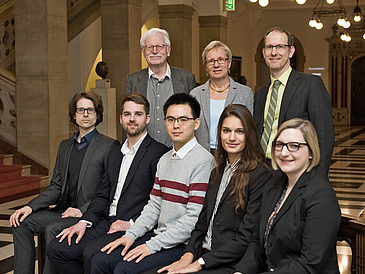True to tradition, once again this year the University of Bremen followed the 33-year-old practice of awarding the Bremen Study Prize for outstanding Master theses and doctoral dissertations. On February 29, this year’s winners were invited to a two-hour ceremony in the City Hall to receive their prizes from Bremen’s Senator for Science, Eva Quante-Brandt, University Vice Rector, Andreas Breiter, and the chairman of “unifreunde” [Friends of the University], Bengt Beutler.
This time, a total of six students of the University received the honor. For four of them, the Bremen Study Prize 2015 was sponsored by “unifreunde”. The firm Bruker Daltonik GmbH and Rotary Club Bremen-Roland contributed two additional prizes for doctoral dissertations, one in the sciences and one in the engineering disciplines.
Living proof of our University’s excellence
In her address, Eva Quante-Bradt, who prior to accepting the post of Senator was herself a professor of the Universityof Bremen, stressed the exceptional drive and pro-active engagement that goes into producing a thesis worthy of the accolade ‘outstanding’. She exemplified the prizewinners’ extraordinary achievement with the words: “Working on a topic independently, taking care to be precise, changing perspectives, developing concepts and rethinking the results”. The Bremen Study Prize illustrates what “good and clever students we have at the University of Bremen.” Addressing the prizewinners, University Vice Rector, Andreas Breiter said, “You are living proof of our University’s excellence.” The chairman of “unifreunde”, Bengt Beutler, stressed that the Study Prize strengthens public awareness of science and the importance of university education for the future development of society. All speakers agreed that the University and science location Bremen couldn’t have better ambassadors.
The prizewinners
The Bremen Study Prize is awarded in different categories: In the areas science/engineering and the humanities/social sciences, one prize each. Two of the winning theses were submitted in the Faculty of Cultural Studies: Dr. Miriam Stehling received the award for her doctoral thesis in communications science titled “Television formats and their appropriation. A transcultural study of top model formats in Germany and the USA”. The second award went to Laura Otto for her Master’s thesis “In Malta, the refugees suffer from the system. An actor-centered ethnography of the contact zones between border regime and refugees”. Her thesis was submitted to the Institute for Ethnology and Cultural Studies.
Dr. Jonas Warneke was awarded the Bremen Study prize for his doctoral thesis in the area of applied and physical chemistry. His research topic: Reaction mechanisms in electron-beam induced separation (FEBID). Jonghyun Lee received the prize for his Master’s thesis in the area of biophysics titled “Specialized search pattern of physarum polycephalum”.
Winners of special prizes
The special prize sponsored by the firm Bruker Daltonik went to Dr. Thomas Page for his doctoral thesis in techno mathematics. The title: “Image reconstruction by Mumford-Shah regularization with a priori edge information”. The Rotary Club Bremen-Roland awarded their special prize to Dr. Felix Patzelt for his doctoral thesis “Instablility and Information“, which spans the areas of physics and economics.
New format
There was a novelty at this year’s prizewinning ceremony. The laudations were read by the prizewinners’ supervisors. Although the foreseen timeframes were sometimes interpreted with a certain degree of creativity, the number and variety of topics were more than capable of riveting the audience’s attention and contributing to a successful festive atmosphere.

